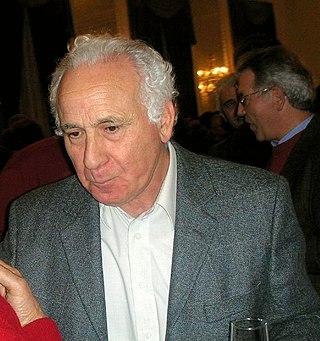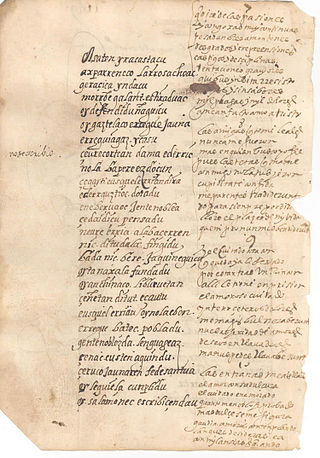Related Research Articles

Basque is the only surviving Paleo-European language spoken in Europe, predating the arrival of speakers of the Indo-European languages that dominate the continent today. Basque is spoken by the Basques and other residents of the Basque Country, a region that straddles the westernmost Pyrenees in adjacent parts of northern Spain and southwestern France. Basque is classified as a language isolate. The Basques are indigenous to and primarily inhabit the Basque Country. The Basque language is spoken by 806,000 Basques in all territories. Of these, 93.7% (756,000) are in the Spanish area of the Basque Country and the remaining 6.3% (50,000) are in the French portion. Basque is considered the most spoken language isolate in the world.

Bernardo Atxaga, pseudonym of Joseba Irazu Garmendia, is a Spanish Basque writer and self-translator.

The Basque Country is the name given to the home of the Basque people. The Basque Country is located in the western Pyrenees, straddling the border between France and Spain on the coast of the Bay of Biscay.
This article provides a grammar sketch of Basque grammar. Basque is the language of the Basque people of the Basque Country or Euskal Herria, which borders the Bay of Biscay in Western Europe.

Joseba Sarrionandia Uribelarrea is a Basque writer who has published a large number of books of poetry and short stories, as well as novels. He has been awarded on numerous occasions for his work, and is nowadays a respected literary personality in the Basque Country.

Erromintxela is the distinctive language of a group of Romani living in the Basque Country, who also go by the name Erromintxela. It is sometimes called Basque Caló or Errumantxela in English; caló vasco, romaní vasco, or errominchela in Spanish; and euskado-rromani or euskado-romani in French. Although detailed accounts of the language date to the end of the 19th century, linguistic research began only in the 1990s.

Joxe Azurmendi Otaegi is a Basque writer, philosopher, essayist and poet. He has published numerous articles and books on ethics, politics, the philosophy of language, technique, Basque literature and philosophy in general.

Ramon Saizarbitoria is a contemporary Basque writer and sociologist.

On March 21, 1890, at a conference dedicated to the siege of Bilbao during the Third Carlist War, Miguel de Unamuno delivered a lecture titled La última guerra carlista como materia poética. It was probably the first-ever attempt to examine the Carlist motive in literature, as for the previous 57 years the subject had been increasingly present in poetry, drama and novel. However, it remains paradoxical that when Unamuno was offering his analysis, the period of great Carlist role in letters was just about to begin. It lasted for some quarter of a century, as until the late 1910s Carlism remained a key theme of numerous monumental works of Spanish literature. Afterward, it lost its appeal as a literary motive, still later reduced to instrumental role during Francoism. Today it enjoys some popularity, though no longer as catalyst of paramount cultural or political discourse; its role is mostly to provide exotic, historical, romantic, and sometimes mysterious setting.

Xabier Lizardi, or José María Aguirre Egaña (1896–1933) was a Spanish poet and writer in the Basque language. He was the main representative of pre-war Basque literature. His Symbolist aesthetic has elicited comparisons with the poet Juan Ramón Jiménez.

16th-century Basque literature begins with three authors considered classics: Joan Perez de Lazarraga, Bernard Etxepare and Joanes Leizarraga. In the manuscript of the first of them, discovered in 2004, the influence of the traditional court lyric, the Italian novela pastoril and the popular Basque templates can be observed. In the case of Etxepare, often compared to the Archpriest of Hita, the influence of French literature has been mentioned. Regarding Leizarraga, translator into Basque of the New Testament and other works on religious themes, he stands out for his attempt to find a unified language—a concern of many of the later authors—and for his use of cultured verbal forms and compound sentences, nonexistent in written literature up to that time.
References
- ↑ Arozamena, A., & Ibargutxi, F. (2001). Koldo Izagirre Urreaga. Retrieved May 28, 2015, from http://www.euskomedia.org/aunamendi/71777
- ↑ "IZAGIRRE, Koldo. Portal Literatura Vasca". www.basqueliterature.com. Archived from the original on 2015-09-23. Retrieved 2020-06-18.
- ↑ Izagirre, K. (2006). Rimmel (Poesia ; 45). Zarautz [etc.]: Susa.
- ↑ Izagirre, K. (1996). Vladimir (Milabidai ; 29). Donostia: Erein.